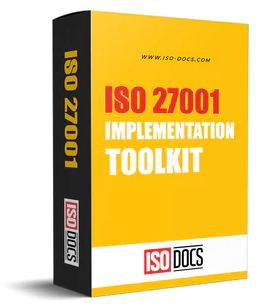Confidentiality: Protecting Your Organization’s Sensitive Information?
Introduction
In Information Security, confidentiality is one of the most important concepts. In other simple words, the confidentiality clause is used to make sensitive information be accessed by only those who need to access it. In this age and era of cyberattacks and insider-threats, data leaks, and other vulnerabilities in data-security, confidentiality is a core priority to an organization. Among companies, who have been seeking ISO 27001 compliance, confidentiality is one of the keystones of the Information Security Management System (ISMS). Otherwise, the organizations risk depositing money and legal punishment as well as damages to their reputation.

What Do You Mean By Confidentiality?
Confidentiality in Information Security: A Confidentiality is the information security term used to describe protection against unauthorized disclosure, access, or exposure. It permits sharing of information both electronic and physical with those delegated to have the authorization.
Confidentiality is defined as one of the three components of CIA triad (Confidentiality, Integrity, Availability) and the core of secure Information Security framework.
Why Confidentiality Is Important?
Confidentiality is one of the pillars of information security and is imperative in guarding information about organizations as well as clients.
-
Secures Confidential Information: Prevents money extortion, theft of bank statements, customer information, trade secrets, and intellectual property. Proper confidentiality means that critical assets are not accessed and misused unlawfully.
-
Creates Confidence: Shows clients, partners, and stakeholders that their data will be dealt with responsibly. Maintaining confidentiality boosts business associates and builds business credit.
-
Supports Compliance: The regulations correspond with compliance with regulatory frameworks such as ISO 27001, GDPR, and HIPAA, whose confidentiality control requirements are stringent. Legal risks are minimized and organizations are also ready to tackle an audit through compliance.
-
Avoids Losses: Data leaks or breaches may lead to fines and lawsuits as well as loss of revenue. Confidentiality of information protects against such and other financial risks and guarantees smooth running of a business.
- Protects Reputation of the Organization: Confidentiality is vital and disclosure of information may destroy the esteem of the masses and reputation. Professionalism and stakeholder confidence thrives when there are strong confidentiality practices.
Types Of Confidential Information Under ISO 27001
Organizations deal in a lot of confidential data. ISO 27001 entails determining and categorising all sensitive information.
1. Customer Information
- Names, addresses, phone numbers and emails
- Bookkeeping and payment information
2. Employee Information
- HR Databases, personal information and contract details, salaries
3. Intellectual Property
- Patents, designs, proprietary algorithms and research data
4. Business Information
- Strategies, internal reports, marketing campaigns
- Vendor contacts and contracts
5. Digital Assets
- Encrypted email systems, databases, cloud systems and SaaS applications
The Major Concepts Of Confidentiality Are:
Successful confidentiality management is based on clear principles and formation of well-organized procedures. APR top recommendations are as follows:
1. Access Control
- Restrict access to sensitive data depending on jobs.
- Apply the strongest authentication methods including passwords, multi-factor authentication (MFA), and biometric verification.
2. Data Classification
- Categorize data on sensitivity (e.g. public, internal, confidential, restricted).
- Enforce proper security based on classification.
3. Encryption
- Encrypt sensitive information in the rest and in transmission.
- Strong encryption algorithms should be used to preclude unauthorized access.
4. Least Privilege Principle
- Provide the least amount of access needed by the users to complete their duties.
- Review and withdraw access rights that are unnecessary on a regular basis.
5. Physical Security
- As protection against unauthorized access to physical documents and devices.
- Apply locked storage, access badge and surveillance systems.
Best Practices To Maintaining Confidentiality
To enhance confidentiality throughout the organization, consider the following strategies that have been proven to be efficient in an ISO 27001-compliant environment:
-
Periodically Review Security Policies: Ensure policies are up to date with threats, regulations and best practices. Routine updates can ensure the staff is aware of the current mandates of handling sensitive information and continuation of compliance.
-
Enact Powerful Password Rules: They have to be sophisticated, individual passwords, and be frequently updated. In conjunction with multi-factor authentication (MFA), it lowers the chance of an unauthorized user accessing your technology even further.
-
Apply Data Loss Prevention ( DLP ) Tools: Improve the security of confidential information by deploying DLP solutions to detect, monitor, and prevent unauthorized information sharing or leakage. This has an added advantage of a secure level of action in protecting sensitive assets.
-
Safe Communication Channel: All communication should be under the encrypted email, VPN, and Secure messaging platforms. Secure channels ensure that information being transported is not accessed by someone who is not supposed to do this.
-
Minimize the exposure of data: Use the least privilege principle to communicate information with people who require it. Restrict distribution to the minimum necessary to limit the possibility of either involuntary or malicious disclosure.
- Organize Awareness campaigns: Be confidentiality part of the organizational culture, always train, remind and propagate. Employees who are engaged will more often comply with security practices and reporting possible risks.
Conclusion
Confidentiality is one of the key concepts of Information Security that maintains confidentiality of sensitive data and prevents unauthorized access to it and its misuse. Confidentiality is paramount because it allows organizations to avoid a number of issues that can lead to financial losses as well as regulatory breach. Organizations can protect their most valuable information assets by 1) exercising strong ISO 27001 confidentiality controls, 2) adopting best practices, such as access control, encryption, and employee training, and 3) actively implementing threat management.


